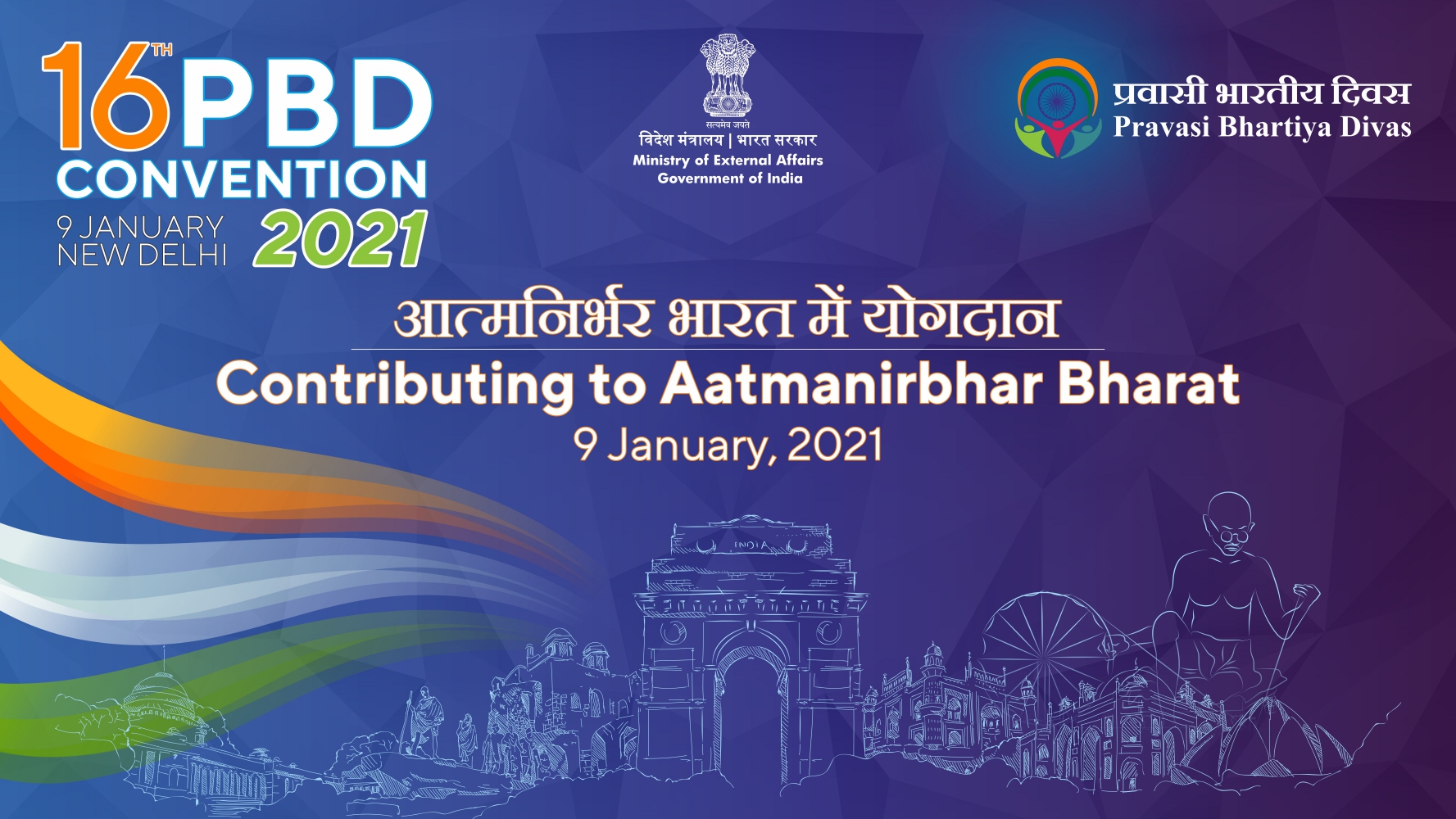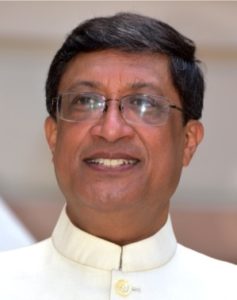Real outcomes for Atmanirbhar Bharat from a virtual PBD2021: Sanjay Bhattacharyya

Though it is being held virtually, the MEA says it has high expectations from the 16th PBD convention
Prime Minister Narendra Modi is set to inaugurate the 16th Pravasi Bharatiya Divas Convention later today. The convention has all the makings of a usual PBD, including a chief guest Chandrikapersad Santokhi, a PIO who was elected President of Suriname last year. The theme of the meet is Contributing to Aatmanirbhar Bharat. It will also feature two plenaries with high-level representatives of the Indian government as well as the Indian diaspora from across the world.
The winners of the online Bharat ko Janiye Quiz for the youth will also be announced. The inaugural session will be followed by the two plenary sessions. The first plenary on Role of Diaspora in Aatmanirbhar Bharat, will feature addresses by external affairs minister and commerce and industry minister. The second plenary on Facing Post Covid Challenges – Scenario in Health, Economy, Social and International Relations, will be addressed by minister of health and minister of state for external affairs. The finale would be announcement of the names of the Pravasi Bharatiya Samman Awardees for 2020-21 and the valedictory address by President Ramnath Kovind. Pravasi Bharatiya Samman Awards are conferred to select Indian diaspora members to recognise their achievements and honour their contributions to various fields, both in India and abroad.
Even though it has the routine agenda and format, PBD2021 is starkly different from the 15 earlier conventions that have been organised so far. This is the first virtual meet, with the entire convention taking place in the ether space. Irrespective of the different format of the meeting, Sanjay Bhattacharya, secretary (Consular Passport and Visas & Overseas Indian Affairs), of ministry of external affairs, says that the meeting is expected to bring real outcomes as the preparatory events organised before the main convention have shown.
The Pravasi Bharatiya Divas Convention is organised on January 9 to commemorate the day that Mahatma Gandhi arrived in India from South Africa and went on to lead the freedom struggle. In an interview with Media India Group, Bhattacharyya explains the run up to the convention, how events around the main convention have been organised at all Indian missions overseas as well as the activities of the MEA to help the diaspora during the pandemic.
So far, how has it been going with the e-Pravasi Bharatiya Divas?
This is the first time we are doing a virtual PBD and it has been quite remarkable actually because we have done four Pravasi Bharatiya Divas conferences: ones that are before the convention, including the youth Pravasi Bharatiya Divas conference which was conducted this morning and what we have realised is that we have actually reached out to a much larger audience because the kind of hits we have had has been absolutely very exciting because what we have done is not just the participation of those who were there, but we have livestreaming both on the MEA and the PBD websites, and then our mission across the world are doing this further from their own websites as well. So, the outreach has been very exciting. For tomorrow, in fact, we are very excited about it. In many of the places, they are going to be hybrid sessions. Not only the outreach from the mission, but we are going to be doing small physical sessions in many of the places.
What are the main takeaways you may want to talk about from whatever has happened so far?
It seems for contributing to Aatmanirbhar Bharat and the Pravasis can become part of that process. Our basic approach has been to the 4Cs of care, connect, celebrate and contribute. And of course, PBD is the highlight of the celebrate part and what we have been trying in this particular set of PBD is the conference and the sessions tomorrow elsewhere just to see how we can take the contribute part further and to integrate our Pravasis and their efforts into the National Development Programme. I think this is now becoming a more conscious effort and I think as you will see in the two categories tomorrow which are one. contributing to Atmanirbhar Bharat and the participants are going to be there and we will be discussing different facets that can become an important part of the policy. And of course, given what 2020 has been, the second panel is really on how we keep clear of post-Covid challenges in different sectors and it will provide important suggestions of that. So, we are very, very excited about that as well.
But do you think there is something lacking as people are not face-to-face because for many diaspora members, being in front of the elected representatives and ministers was important. Do you think that element is being missed this time around?
The physical meetings and the physical PBDs that we have had in the past have had their own value and I don’t think we are trying to say that a virtual session can replace or replicate all of that. But I think, given the very trying times that the entire world has gone through because of Covid, the decision was taken that our connect with our Pravasis, actually a very deep one, and while we do appreciate the essence of the physical contact and recognise that it cannot fully replicate it, virtual ones would keep that contact alive and that sentiment alive and we are obviously seeking to optimise what we can in these somewhat constrict circumstances. And I think the initial signal that we had in all the PBDs we have had so far, has been extremely enthusiastic. We do wish to go back to the physical PBDs because that had a certain value and charm and connect in terms of our heritage as well. Our heritage is one in which we love that contact. So, we would love to go back to that at the earliest opportunity, but we do not wish to say that we have been held back because of Covid. We are saying despite Covid we shall forge ahead.
The Indians in the Gulf have been very badly impacted by the pandemic, did this/will this figure in the discussions?
There was a special session on the Indians in the Gulf and the lessons that we have learnt from that session has been very, very interesting. The first thing that we realised is that the Indians were affected by the pandemic as well as the general economic downturn because of the prices in the Gulf that have been hit. But what is encouraging is that the hit was not as high as that have been anticipated and projected by certain quarters, in fact the actual hit was way lower than what was projected. So only about 400,000 workers and professionals left the Gulf and this is way short than what some of the projections were. What has also been very encouraging is both the Prime Minister and the external affairs minister have been in constant contact with the Gulf leadership. PM has spoken to all the Gulf Leaders. EAM has visited many of the Gulf countries in the recent days. And what we have found from the Gulf leadership is that they highly value the contributions of the Indian workers and professionals and they have all said that the Indian worker/professional is the preferred candidate for any opening that comes up over there and this has also been an evidence because the number of people who have gone back to the Gulf in the first flush and in the continuing flush of people going back has shown that we have more than 100,000 professionals who have gone back. So, the signs are that while there has been a hit, the hit has been not as much.
The other thing that is also important to note is that there had been very a dire prediction about the decline in the remittances, that there would be a huge hit in terms of remittances, but the actual data, if you look at what the banks have received, actually showed that there might have been an increase in the Gulf remittances. These are initial figures, but in the final analysis we would probably see a decline, but I think, again the decline has not been as much as it has been projected by various portals.
Gulf remains an area what we would remain to be a preferred candidate and our bonds with the Gulf are so deep that we are confident we would be able to regain our lost ground. We were particularly excited that in the Gulf session, private sector has been working very well in trying to identify the future areas. As you know, we have been working with the GCC countries in trying to identify the skills that will be required in the days to come.
The skill mapping exercise will give Indians an advantage in terms of getting into the Gulf, into the new jobs that come up. The second thing we have been working on an integration of our migration platform with two of the Gulf states, with Saudi and the UAE, which have two of the largest populations of Indian workers in particular and this integration exercise gives the Indian worker a huge advantage in terms of transparency and proceeding on a professional contract to these two countries. And this is an exercise that we are now extending to other GCC countries. In the course of the year, we will see progress with other GCC countries as well. There are other measures which will place the Indian migrant worker on a better footing.
In the meanwhile, is there anything being done to help the people who had to come back and obviously, economically, they must be in dire straits?
That is something that we work with various governments and ministry of skill development here. The Vande Bharat Mission in many ways, with a huge success in bringing them back when they were in distress and subsequently, in facilitating their return. When they are here, of course the various state governments and various other ministries, we have developed certain modules for their rehabilitation.










